Two variety trial sites in Co Cork and one in Waterford were visited in the past few weeks, namely one of the Department of Agriculture’s sites in Ballyderowan, Goldcrop’s site in Shanagarry and Seedtech’s site at Faithlegg.
Disease pressure was generally high.
It’s a great time of the year – the variety open days create a sense of anticipation and provide attendees with a look to the future.
Some will be talked about a lot and may fall by the wayside, not hitting the necessary targets.
More will make it through the rigorous selection process and, perhaps most exciting of all, some that we see in trial at these days could be the next RGT Planet or JB Diego – stalwarts of the tillage fields.
The Seedtech variety is the first of these BYDV-tolerant varieties on the market, but it is yet to be recommended
This year, a big positive was an increased number of BYDV-tolerant varieties coming on stream. The events allowed what looks to be an impressive KWS Joyau winter barley to be shown off.
The Seedtech variety is the first of these BYDV-tolerant varieties on the market, but it is yet to be recommended. It appeared relatively clean, despite ramularia pressure evident across most varieties, and brings hope to what can be a serious yield-grabbing virus.
In the spring barley plots at Goldcrop’s Shanagarry trial site, one plot gained a lot of attention. Still with just a number on its label, it is the first to be made public here as a BYDV-tolerant spring barley variety. It could be a game changer, but it has a few years of testing ahead before we know if it will make the cut.
There were plenty of good things to see, but there was also cause for concern. Winter wheat plots looked dirty and few can claim more than a five in septoria ratings. The high disease pressure site of Ballyderowan, Co Cork, (one of the Department of Agriculture’s farms) was most worrying in this regard. Despite a robust fungicide programme, rain delayed spraying by a few days and added pressure to crops.
Yellow rust was not a major problem in the southern variety trial sites, but has caused serious problems on many farms across the country
Disease levels were high and few stood out with any great resistance to septoria. Yellow rust was not a major problem in the southern variety trial sites, but has caused serious problems on many farms across the country, particularly in the northeast.
Across the crops and varieties, it was clear that there was a dependence on some of the better known varieties for breeding and this makes sense.
Many of the new spring barley varieties, for instance, stem from RGT Planet or Laureate. Both of these have been strong for different reasons, including consistent yield and straw strength, respectively.

Geraldine is a new spring barley variety from Goldcrop.
Geraldine (Goldcrop, 6% seed availability) and SY Amity (Seedtech, 4% seed availability) are two spring malting barley varieties which have Planet and Laureate in their parentage, enough to make any grower get their seed order in early.
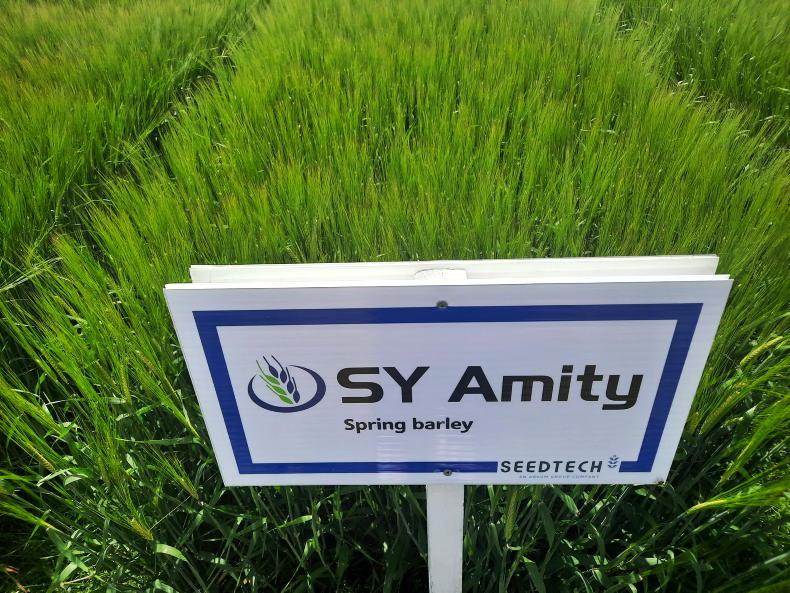
SY Amity is a new spring barley variety from Seedtech.
Geraldine is in its third year of trial for the recommended list with the Department of Agriculture and it has relative yield scores of 105 and 102 in 2019 and 2020. It boasts strong traits on mildew and has good resistance to rhynchosporium and net blotch.
SY Amity is now in its second year of three in trial for the recommended list where it scored 100 for relative yield last season, but previously reached 107 on national list trials.
Spring barley looked relatively clean at all sites, with small levels of old rhynchosporium visible in treated plots in Ballyderowan.

A BYDV-tolerant variety of spring barley which has a few more years of testing ahead.
The major player in spring barley for next season will remain RGT Planet, while Gangway and SY Errigal follow closely, both with strong straw characteristics.
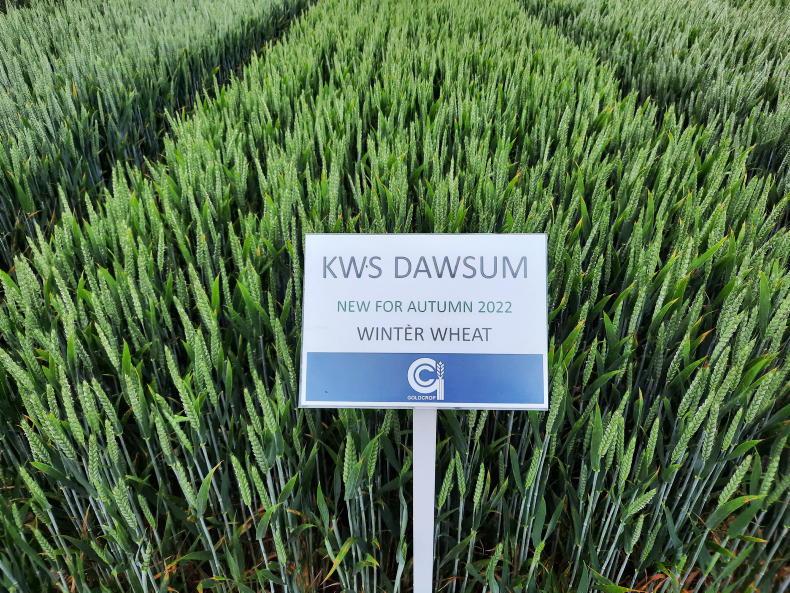
KWS Dawsum is one of the new winter wheat varieties coming to the market. Seed will be limited for the coming season.
In the winter wheat plots, there were fewer varieties sticking out and many of the new varieties stem from Cougar. These varieties were scoring well on relative yield, but appeared poor on septoria. It should be noted that most wheat looked under pressure. Rain really came at the wrong time this season and where the T2 timing was stretched to over three weeks, pressure was high.
LG Illuminate, Rembrandt and KWS Dawsum are new for 2021 from Goldcrop. Dawsum, which still needs to be multiplied for seed, looked the cleanest of these varieties.

KWS Dawsum is one of the new winter wheat varieties coming to the market. Seed will be limited for the coming season.
Where these varieties fall on septoria, they are reported to be good on yellow rust and appeared rust-free in the plots in Cork.
Graham will remain the dominant variety in wheat next season with a score of six for resistance to septoria. Also coming from Seedtech is SY Insitor (a five on septoria) and LG Astronomer (another Cougar cross).
As chemistry becomes harder to come by and with more products being placed off the market, variety becomes more important than ever.
The pressure on wheat this season is concerning and shows the importance of integrated pest management strategies.
Wheat is one of our best-performing crops, but correct timings, robust fungicide rates and attention to crop stress and nutrition will all help to make varieties and chemistry last longer and maintain resistance to the main diseases.
In spring wheat, WPB Escape and Helium will have a small level of seed availability for 2022, while WPB Duncan is the dominant variety and is known for good resistance to sprouting.
Hexham has increased to 26%. It has the highest relative yield on the list at 104 and scores well on yellow rust and mildew. KWS Talisker looked well in plots. It also scores highly on yellow rust and mildew and rates a six for resistance to septoria. It has a relative yield of 102.
Husky is the dominant oat variety, followed closely by WPB Isabel, with Barra holding its small share for food-grade markets.
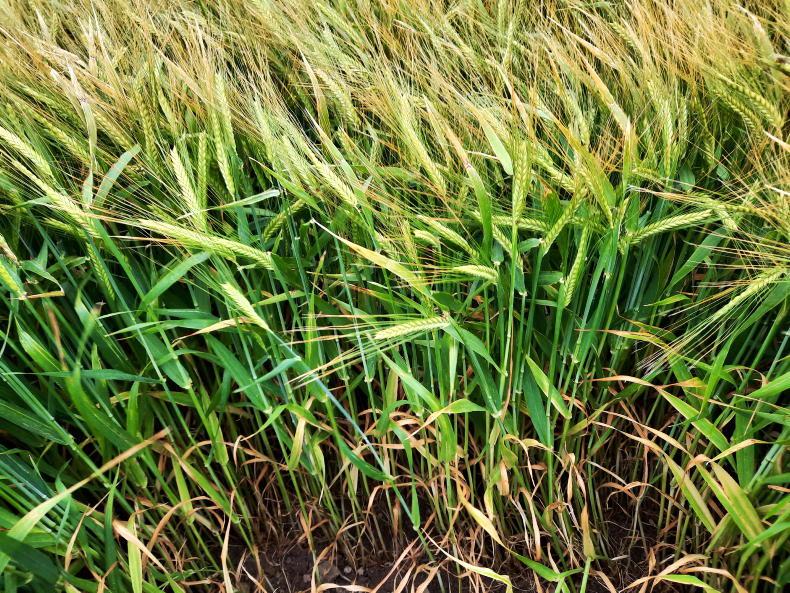
LG Casting winter barley.
In winter barley ramularia is now the main concern and there was no shortage of pressure in untreated plots, but varieties were generally impressive.
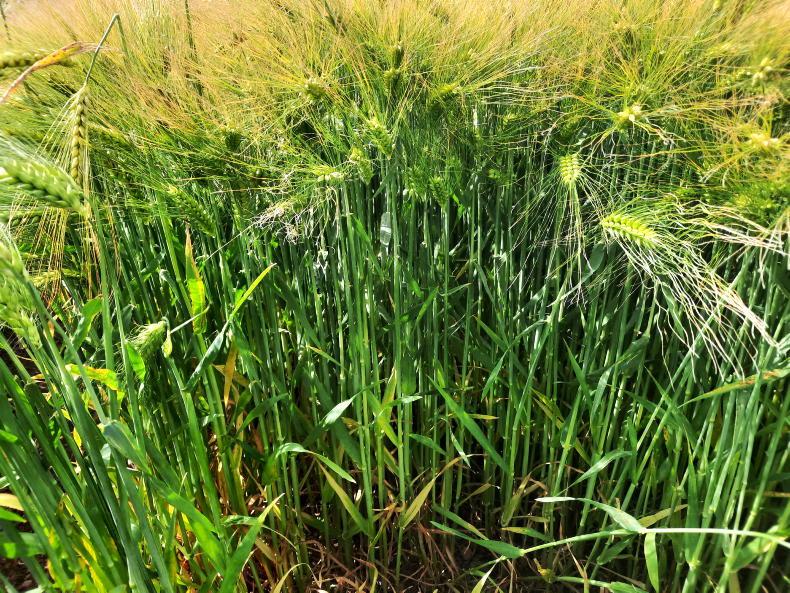
KWS Joyau winter barley at the Seedtech trial site in Faithlegg. This variety is BYDV-tolerant.
As mentioned already, KWS Joyau looked strong and clean. Belfry remains the dominant six-row with a relative yield score of 109.The new two-row, KWS Tardis from Goldcrop, has good tillering capacity and is coming near six-row varieties on yield. LG Casting is a consistent two-row, but needs careful plant growth regulation management. One to watch is SY Vessel, a winter malting barley variety.

Tundra winter beans on the Goldcrop trial site at Shanagarry, Co Cork.
Caprice is an up-and-coming spring bean variety from Goldcrop (13% seed availability for 2022), who were also showing a trial of Tundra winter beans.
Ag Climatise outlines potential to grow 40,000ha of beans in the coming years. The industry is aiming for 25,000ha by 2025.
If this is to come about, winter beans could play a role as they have the possibility of flowering before drought conditions have occurred in recent years and have a slightly earlier harvesting date than spring beans.
Deep planting will be required to lower the risk of crow damage.
Looking at oilseed rape, it is one crop which is seeing continual improvements in yield and the advancement of the Clearfield varieties to control brassica weeds in crops.
More consistent yields are making the crop more attractive and high prices this season will no doubt increase interest in the crop.
DK Expansion from Goldcrop is one of the varieties with good yield potential and is provisionally recommended for the coming planting season. It is tall, but it has good resistance to lodging.
The rye area almost tripled this season to reach 1,298ha, with some grain buyers seeing it fitting into the winter barley category for animal feed.
SU Performer, Tayo and KWS Serafino were the three varieties in focus, with grain yields of 10t/ha to 13t/ha and high straw yield.
Winter wheat disease levels are high and lack of septoria resistance is a worry.A BYDV tolerant spring barley is now in trial.BYDV-tolerant winter barley, KWS Joyau, looks promising.There is an increased focus on break crops such as oilseed rape, beans and rye.Winter wheat varieties are scoring low for resistance to septoria.Ramularia levels in winter barley are a concern, but many varieties are coping well with pressure.
Two variety trial sites in Co Cork and one in Waterford were visited in the past few weeks, namely one of the Department of Agriculture’s sites in Ballyderowan, Goldcrop’s site in Shanagarry and Seedtech’s site at Faithlegg.
Disease pressure was generally high.
It’s a great time of the year – the variety open days create a sense of anticipation and provide attendees with a look to the future.
Some will be talked about a lot and may fall by the wayside, not hitting the necessary targets.
More will make it through the rigorous selection process and, perhaps most exciting of all, some that we see in trial at these days could be the next RGT Planet or JB Diego – stalwarts of the tillage fields.
The Seedtech variety is the first of these BYDV-tolerant varieties on the market, but it is yet to be recommended
This year, a big positive was an increased number of BYDV-tolerant varieties coming on stream. The events allowed what looks to be an impressive KWS Joyau winter barley to be shown off.
The Seedtech variety is the first of these BYDV-tolerant varieties on the market, but it is yet to be recommended. It appeared relatively clean, despite ramularia pressure evident across most varieties, and brings hope to what can be a serious yield-grabbing virus.
In the spring barley plots at Goldcrop’s Shanagarry trial site, one plot gained a lot of attention. Still with just a number on its label, it is the first to be made public here as a BYDV-tolerant spring barley variety. It could be a game changer, but it has a few years of testing ahead before we know if it will make the cut.
There were plenty of good things to see, but there was also cause for concern. Winter wheat plots looked dirty and few can claim more than a five in septoria ratings. The high disease pressure site of Ballyderowan, Co Cork, (one of the Department of Agriculture’s farms) was most worrying in this regard. Despite a robust fungicide programme, rain delayed spraying by a few days and added pressure to crops.
Yellow rust was not a major problem in the southern variety trial sites, but has caused serious problems on many farms across the country
Disease levels were high and few stood out with any great resistance to septoria. Yellow rust was not a major problem in the southern variety trial sites, but has caused serious problems on many farms across the country, particularly in the northeast.
Across the crops and varieties, it was clear that there was a dependence on some of the better known varieties for breeding and this makes sense.
Many of the new spring barley varieties, for instance, stem from RGT Planet or Laureate. Both of these have been strong for different reasons, including consistent yield and straw strength, respectively.

Geraldine is a new spring barley variety from Goldcrop.
Geraldine (Goldcrop, 6% seed availability) and SY Amity (Seedtech, 4% seed availability) are two spring malting barley varieties which have Planet and Laureate in their parentage, enough to make any grower get their seed order in early.

SY Amity is a new spring barley variety from Seedtech.
Geraldine is in its third year of trial for the recommended list with the Department of Agriculture and it has relative yield scores of 105 and 102 in 2019 and 2020. It boasts strong traits on mildew and has good resistance to rhynchosporium and net blotch.
SY Amity is now in its second year of three in trial for the recommended list where it scored 100 for relative yield last season, but previously reached 107 on national list trials.
Spring barley looked relatively clean at all sites, with small levels of old rhynchosporium visible in treated plots in Ballyderowan.

A BYDV-tolerant variety of spring barley which has a few more years of testing ahead.
The major player in spring barley for next season will remain RGT Planet, while Gangway and SY Errigal follow closely, both with strong straw characteristics.

KWS Dawsum is one of the new winter wheat varieties coming to the market. Seed will be limited for the coming season.
In the winter wheat plots, there were fewer varieties sticking out and many of the new varieties stem from Cougar. These varieties were scoring well on relative yield, but appeared poor on septoria. It should be noted that most wheat looked under pressure. Rain really came at the wrong time this season and where the T2 timing was stretched to over three weeks, pressure was high.
LG Illuminate, Rembrandt and KWS Dawsum are new for 2021 from Goldcrop. Dawsum, which still needs to be multiplied for seed, looked the cleanest of these varieties.

KWS Dawsum is one of the new winter wheat varieties coming to the market. Seed will be limited for the coming season.
Where these varieties fall on septoria, they are reported to be good on yellow rust and appeared rust-free in the plots in Cork.
Graham will remain the dominant variety in wheat next season with a score of six for resistance to septoria. Also coming from Seedtech is SY Insitor (a five on septoria) and LG Astronomer (another Cougar cross).
As chemistry becomes harder to come by and with more products being placed off the market, variety becomes more important than ever.
The pressure on wheat this season is concerning and shows the importance of integrated pest management strategies.
Wheat is one of our best-performing crops, but correct timings, robust fungicide rates and attention to crop stress and nutrition will all help to make varieties and chemistry last longer and maintain resistance to the main diseases.
In spring wheat, WPB Escape and Helium will have a small level of seed availability for 2022, while WPB Duncan is the dominant variety and is known for good resistance to sprouting.
Hexham has increased to 26%. It has the highest relative yield on the list at 104 and scores well on yellow rust and mildew. KWS Talisker looked well in plots. It also scores highly on yellow rust and mildew and rates a six for resistance to septoria. It has a relative yield of 102.
Husky is the dominant oat variety, followed closely by WPB Isabel, with Barra holding its small share for food-grade markets.

LG Casting winter barley.
In winter barley ramularia is now the main concern and there was no shortage of pressure in untreated plots, but varieties were generally impressive.

KWS Joyau winter barley at the Seedtech trial site in Faithlegg. This variety is BYDV-tolerant.
As mentioned already, KWS Joyau looked strong and clean. Belfry remains the dominant six-row with a relative yield score of 109.The new two-row, KWS Tardis from Goldcrop, has good tillering capacity and is coming near six-row varieties on yield. LG Casting is a consistent two-row, but needs careful plant growth regulation management. One to watch is SY Vessel, a winter malting barley variety.

Tundra winter beans on the Goldcrop trial site at Shanagarry, Co Cork.
Caprice is an up-and-coming spring bean variety from Goldcrop (13% seed availability for 2022), who were also showing a trial of Tundra winter beans.
Ag Climatise outlines potential to grow 40,000ha of beans in the coming years. The industry is aiming for 25,000ha by 2025.
If this is to come about, winter beans could play a role as they have the possibility of flowering before drought conditions have occurred in recent years and have a slightly earlier harvesting date than spring beans.
Deep planting will be required to lower the risk of crow damage.
Looking at oilseed rape, it is one crop which is seeing continual improvements in yield and the advancement of the Clearfield varieties to control brassica weeds in crops.
More consistent yields are making the crop more attractive and high prices this season will no doubt increase interest in the crop.
DK Expansion from Goldcrop is one of the varieties with good yield potential and is provisionally recommended for the coming planting season. It is tall, but it has good resistance to lodging.
The rye area almost tripled this season to reach 1,298ha, with some grain buyers seeing it fitting into the winter barley category for animal feed.
SU Performer, Tayo and KWS Serafino were the three varieties in focus, with grain yields of 10t/ha to 13t/ha and high straw yield.
Winter wheat disease levels are high and lack of septoria resistance is a worry.A BYDV tolerant spring barley is now in trial.BYDV-tolerant winter barley, KWS Joyau, looks promising.There is an increased focus on break crops such as oilseed rape, beans and rye.Winter wheat varieties are scoring low for resistance to septoria.Ramularia levels in winter barley are a concern, but many varieties are coping well with pressure. 











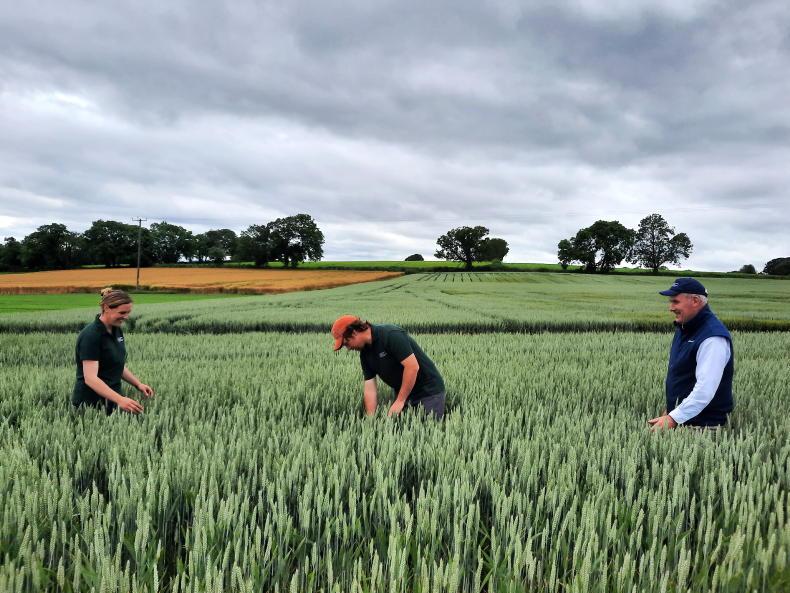
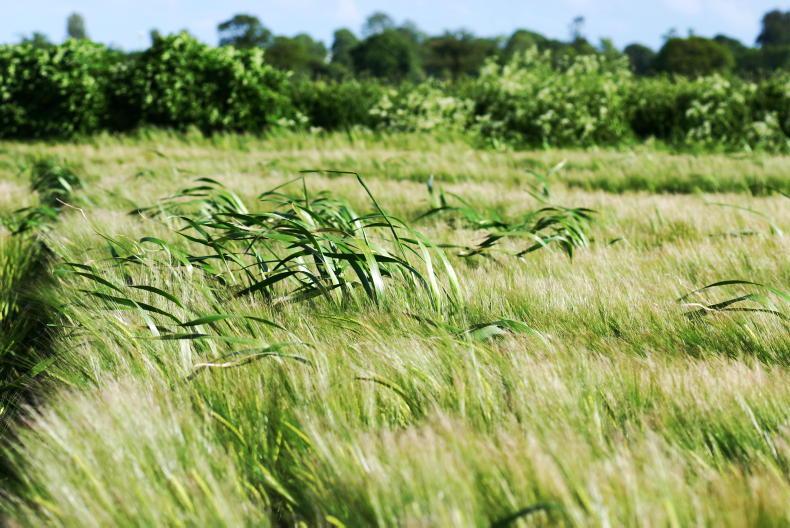
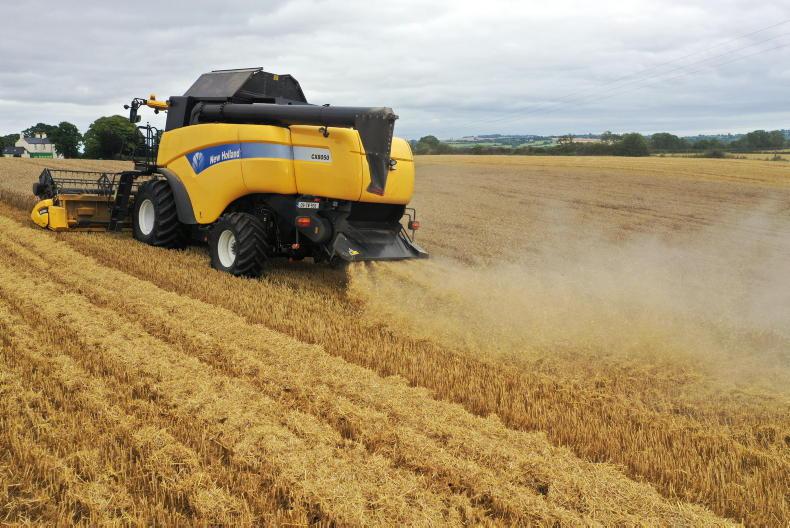
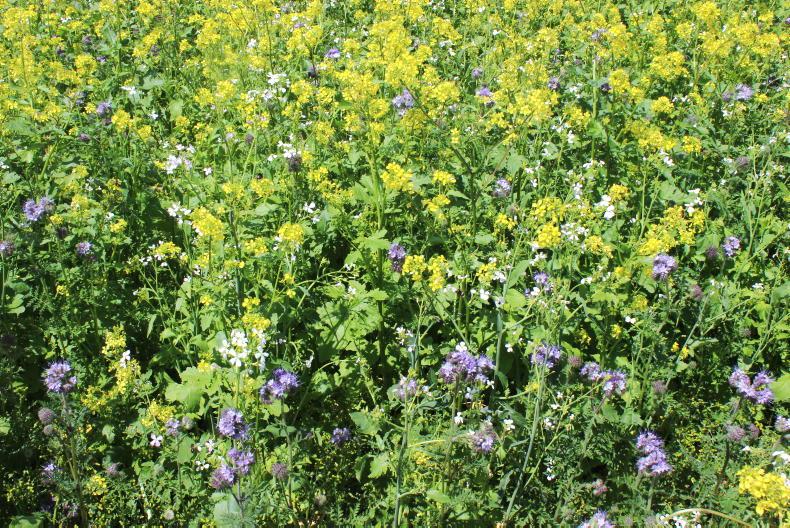
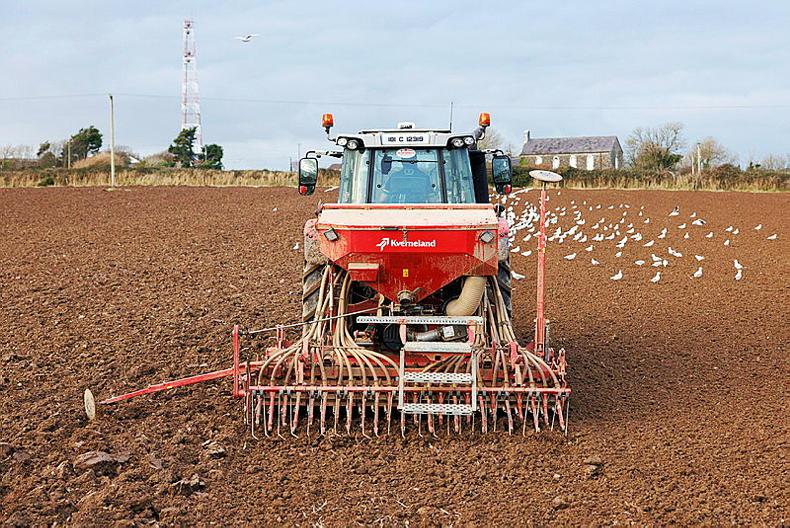
SHARING OPTIONS